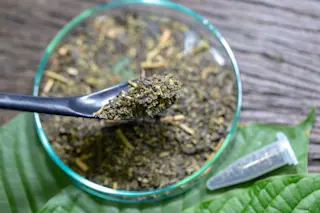Across America, thousands of people are throwing away their prescription drugs and picking up kratom, a plant-based drug from Southeast Asia usually brewed as a tea. Within the leaves of this tropical tree are opioid-like compounds that users say provide pain and anxiety relief, and the ability to wean off street drugs like heroin. But some health organizations warn kratom can be addictive itself or even deadly.
An estimated five million people use kratom regularly, according to the American Kratom Association (AKA), a pro-kratom lobbyist group. And the rising popularity of this herb has caught the eyes of federal government regulators, who have made several unsuccessful attempts to ban it. But that may soon change. The Food and Drug Administration has blocked foreign kratom imports since 2015. And the Drug Enforcement Administration attempted to schedule kratom in 2016 — criminalizing it in the same legal category as heroin or marijuana ...














